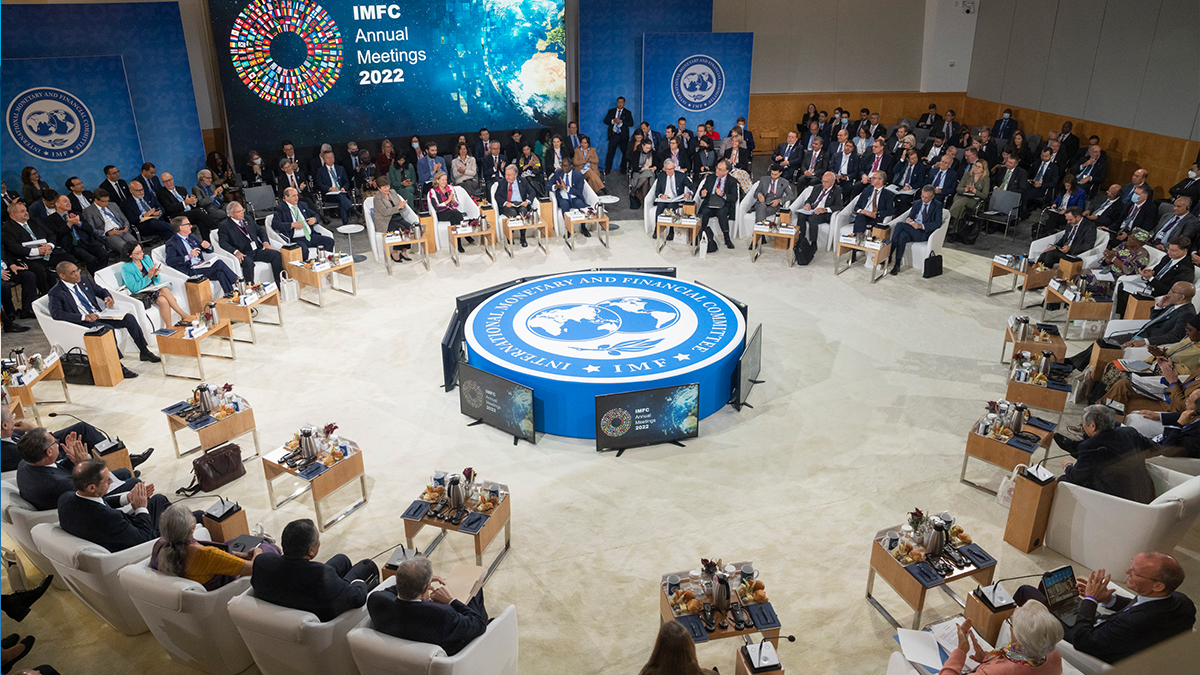Trade cooperation needed to support finance ministers and central bankers
More fragmented, more fragile, and more prone to shocks. This is how Kristalina Georgieva, the Managing Director of the International Monetary Fund (IMF), recently described today's world. With concerns mounting that even more extraordinary challenges lie ahead, the mood among finance officials at the 2022 IMF-World Bank annual meetings was on the gloomy side. Amid overlapping storms, it was clear that we need all hands on deck. Many participants highlighted that, alongside monetary and financial policies, trade and multilateral trade cooperation have a key role to play in building a more resilient world by helping to bring down inflation and reignite growth, minimize the risk of economic fragmentation, and tackle climate change.

© IMF Photo/Cory Hancock
As multiple shocks weigh on the global economy, the trade picture has deteriorated significantly. The World Trade Organization (WTO) recently forecast that global merchandise trade volumes will slow sharply, from 3.5 per cent in 2022 to 1 per cent in 2023. This is bad news not just for trade ministers but for their finance colleagues and central bank governors too. As Dr. Ngozi Okonjo-Iweala, WTO Director-General, reminded participants during the annual meetings, trade remains macro-critical for productive efficiency, for earning foreign exchange to pay for imports and service debt, and for adapting to exogenous shocks. Measures to keep supply chains running under conditions of openness, certainty and predictability can positively impact productivity growth, foster innovation and know-how, and lower prices. Digital trade, including digitally-enabled services, already supercharged by the pandemic, can be an important driver of inclusive and efficient growth in both advanced and developing economies.
Geopolitical rifts and war are driving tensions over trade, technology and security, pushing policy uncertainty to new highs and raising doubts about the ability of global trade cooperation to help sort out the world’s most pressing challenges. The cost of trade decoupling, however, would be huge and should not be underestimated. WTO economists estimate that if the world economy were to break into two self-contained blocs, the long-run level of real global GDP would fall by 5 percent due to less specialization and technology spillovers. In practice, trade fragmentation would mean fewer opportunities for developing countries to connect to global production networks, access much-needed skills and technology and improve living standards; for advanced economies, it would mean higher prices for the same products, fuelling inflation, not to speak of reduced export opportunities to expanding markets in emerging economies. As finance ministers and central bank governors strive to make the global economy more resilient, and to safeguard and expand growth opportunities, global trade cooperation can help ensure that the ongoing reconfiguration of supply chains results in more diversified, deeper and les concentrated global markets.
Discussions on the need and urgency to tackle climate change were front and center at the annual meetings. As ministers called for renewed action and greater resource mobilization on the part of financial institutions to support the transition to a lower carbon economy, the role of trade increasingly came into focus. In an enlightened lecture, former governor of the Reserve Bank of India, Raghuram Rajan, stated that climate action and continued globalization are “joined at the hip”, meaning that the continued growth of cross-border flows of trade, capital, technology, information and people are needed to fight climate change. Trade cooperation has much to contribute to support the dissemination and adoption of climate friendly technologies, the scaling up of circular and low-carbon business models, and the mobilization of the massive green investments that are needed for the transition to net-zero. Greater coordination in the WTO around the use of carbon standards and other measures to achieve climate and other sustainability goals could also help avoid trade frictions.
Ministers urged the World Bank and the IMF to strengthen their ability to address the dangers of today’s world. This call resonates deeply with the WTO, following the decision by trade ministers at the 12th Ministerial Conference last June to set in motion a process to reform the WTO. Some have even suggested that the way forward is a grand bargain to symmetrically reform the WTO and the IMF. Irrespective of how change happens, one thing is clear: global trade cooperation can and should play an increasing role in supporting finance ministers and central bankers as they try to bring the global economy out of the woods.
* Anabel González was Deputy Director-General from June 2021 to August 2023
